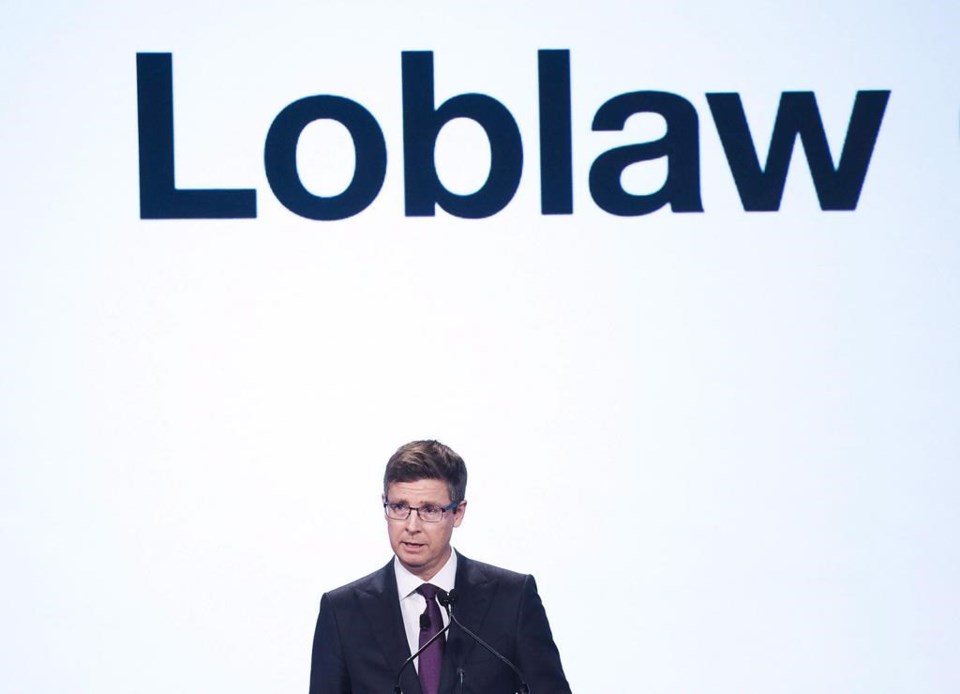OTTAWA — The leaders of sa╣·╝╩┤½├Į's major grocery chains insist that food price inflation is not caused by profit-mongering and that their margins on food-related profits have remained low.
The CEOs and presidents of Loblaw Cos. Ltd., Metro Inc. and Empire Co. Ltd. — which operates chains including Sobeys, Safeway and FreshCo — appeared Wednesday in front of a parliamentary committee that is studying inflated grocery prices.
Their testimony came amid calls from federal politicians, including Finance Minister Chrystia Freeland and NDP Leader Jagmeet Singh, for the industry to be more transparent about what is driving its record-high profits.
It is "false" to suggest that grocers are responsible for high food prices, all three leaders told members of Parliament, saying food inflation is a global problem.
"It doesn’t matter how many times you say it, write it or tweet it. It simply is not true," said Michael Medline, the president and CEO of Empire.
"The truth is we are at the end of a very long food supply chain that has economic inputs at every step and stage."
Grocery prices were up 11.4 per cent in January compared to a year ago, nearly double the overall rate of inflation of 5.9 per cent.
At the same time, there has been a rise in corporate profits writ large, and major grocers have been outperforming. All three companies posted higher profits in the first half of 2022 compared to their average performance over the past five years, according to a report last fall by the Agri-Food Analytics Lab at Dalhousie University.
Loblaw's gross profit in the first half of 2022 beat its previous best results by $180 million — equivalent to about an extra million dollars a day, the research found.
Galen Weston, the billionaire chairman and president of Loblaw, said the company has made bigger profits off financial services and apparel and pharmacy sales, which he said represents more than half of its business.
He said the company's profits amount to about $1 for every $25 spent on groceries, and food prices have increased about 25 times faster than profit margins on food product.
"The idea that grocers are causing food inflation is not only false, it’s impossible," he said.
The NDP had insisted on meeting to hold CEOs accountable for what they term "greedflation," and Singh advertised his showdown with Weston in a slate of social-media posts ahead of the meeting. The party even created a page on its website allowing supporters to RSVP to watch it unfold.
Singh, subbing in for the party's agriculture critic, directed his questions to Weston, who was sitting just a few metres away.
"They look at you and they see you making record profits. How can you justify that when families are struggling to put food on the table for their kids?" he implored.
"We feel and understand that 95 per cent of Canadians are concerned about food prices. But grocery chain profits are not the reason for food inflation," Weston answered.
"How much profit is too much profit?" Singh asked repeatedly.
Weston proffered: "Reasonable profitability is an important part of operating a successful business." He added that the company reinvests those profits into opening new stores and hiring more employees. "It doesn't go to me. It goes back into this country."
Medline had quipped earlier: "It is folly to suggest that an unprofitable grocery business is somehow better for customers and better for shelf prices."
Liberal MP Ryan Turnbull asked Weston whether Loblaw would commit to sharing its detailed financial statements with the Competition Bureau, which is studying whether a lack of competitiveness in the grocery industry may be contributing to higher prices.
Weston said the company has already submitted such documents, though because they are "competitively sensitive pieces of data," the company is "resistant" to disclosing them publicly.
Earlier on Wednesday, Freeland said at a news conference that the CEOs "absolutely do have a responsibility to all of us to be transparent" about why prices are so high.
"And I hope they're going to tell us that the prices are going to start coming down," she said.
Medline said that so far in 2023, the volume of cost increase requests from suppliers has been similar to that of last year. But there is a "slight indication" that such requests will slow in April.
He was quick to assert that he was not going to "throw our supplier partners under the bus."
"They are also doing their best in extraordinary times. They are greatly impacted by rising costs, which, unfortunately, they are forced to pass on to retailers," he said.
During the committee hearing, Medline and Eric La Flèche, the president and CEO of Metro, both questioned why MPs seemed to be excluding from their study large American companies that operate in sa╣·╝╩┤½├Į.
The committee unanimously agreed to invite Horacio Barbeito, the president and CEO of Walmart sa╣·╝╩┤½├Į, and Pierre Riel, who is at the helm of Costco Wholesale sa╣·╝╩┤½├Į.
This report by The Canadian Press was first published March 8, 2023.
The Canadian Press



